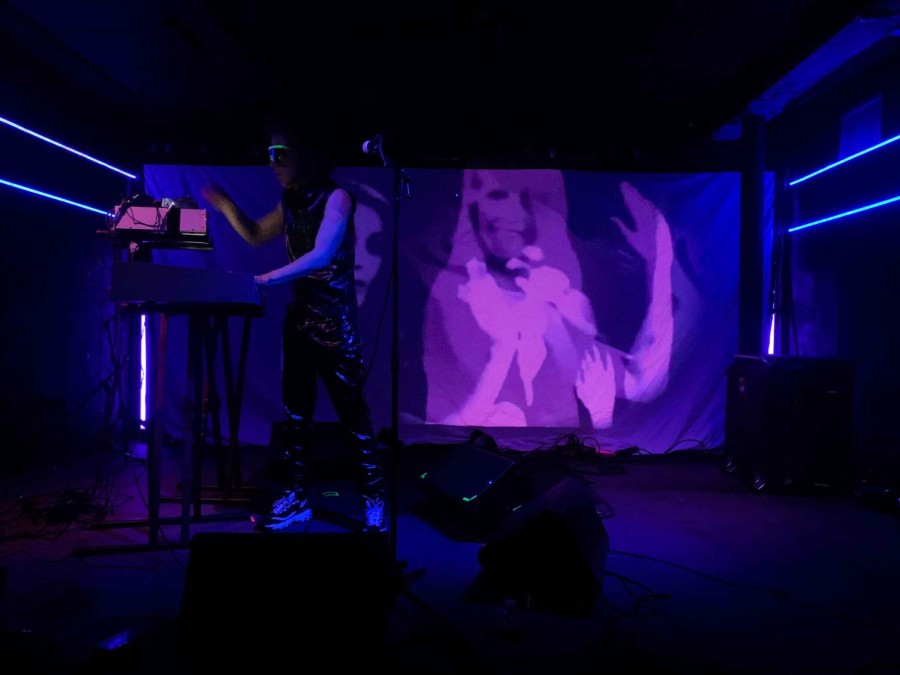Review: ‘Surrender’ is Suicide at their best
“Surrender,” Suicide’s first compilation album, is a celebration of the anarchic synth-punk of a New York staple.
Alan Vega and Martin Rev were the members of the band Suicide. (Staff Photo by Nicolas Pedrero-Setzer)
April 14, 2022
Suicide is sound, and “Surrender” captures all of it. Known as Suicide, multi-instrumentalist Martin Rev and vocalist Alan Vega’s no-wave music act pioneered synth-pop, proto-punk and electro-shrieks. Their crazy sounds rippled across the music world, influencing everyone from M.I.A. to The Jesus and Mary Chain, spawning new genres in the process.
The recently released “Surrender” collects an eclectic mix of 16 remastered songs from Suicide’s 40-year lifespan. Together, this curated list of Suicide’s best hits displays the band’s violent production and avant-garde sensibilities.
In typical Suicide fashion, “Surrender” starts off aggressively with “Dominic Christ,” a song with beats befitting the gangster flicks of Brian De Palma but with lyrics more suited to a protest than a concert. The abrasiveness is inherent to the band’s ethos, ever-present in their name. The jarring qualities of “Dominic Christ” recall an archaic form of music making that dialectically smashed together older styles of music to form something new and excitingly disturbing. In this case, Vega yelling Beat poetry-inspired lyrics atop Rev’s scintillating synth production makes for an aggressive synth-pop anthem from before the term was even coined.
The rest of the album’s songs accomplish a similar conflation of abrasiveness and groundbreaking music. The best example of this being “Dachau, Disney, Disco,” in which Alan Vega repeats the aforementioned and utilizes disparate words while highlighting how the absurd rules of the alphabet group them together. As Vega formalistically attacks the alphabet, Rev delivers a synth loop that sounds like raining metal, making the song sound like neither Dachau, Disney or disco, but rather an abominably danceable mix of all the sounds one could possibly associate with them.
Suicide is a collaboration between a kid who was inspired to join a band after tuning into the sound of shaking marbles, and a practically homeless artist so moved by Iggy Pop that he decided to leave his wife and create music. This has never been more clear than on “Surrender,” but Suicide’s influence and artistry extend themselves far beyond their cacophonous components. Funnily enough, it’s their most formally structured songs that remain catchiest in retrospect. Tracks like “Dream Baby Dream” and “Frankie Teardrop” are so flawlessly laid out that you learn to ignore their extensive lengths.
Forty years later, the anarchy of “Dominic Christ” is still palpable, but it’s the meticulously calibrated dance of sorrowful crooning and celestial synths showcased in “Cheree” that will bring in new listeners while reminding longtime fans why they fell in love with Suicide in the first place. Even though “Dream Baby Dream” repeats its eponymous phrase many times over the span of its six minutes and 20 seconds — four seconds shorter than the version that rounds out “The Second Album — the mantric track ensnares listeners with its repetitive and hallucinatory charm.
The magic of Suicide extends beyond their predilection for shrieking over feedback loops and composing songs by bashing buttons. Their magic resides in their ability to temper chaos within the allotted runtime of their tracks, as heard in the stretched-out loops of “Why Be Blue?” and the pulsating production of “Ghost Rider.”
Listening to Suicide is an act of surrender. It’s inherent to their name, one that alludes to the act of surrendering life. Perhaps that allusion is too overt, a mere punk gesture playing with transgressive nomenclature. Nonetheless, the allusion remains. In existing, it suggests the musical success of a band whose every song solicits a surrender of the soul, a killing of the self, and admittance of the anarchic rhythm of life. Suicide translates this into sonic reveries that identify said anarchy as absurd by presenting it as art.
Contact Nicolas Pedrero-Setzer at [email protected].




























































































































































